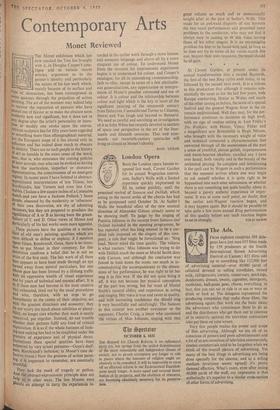London Opera BOTH the London opera houses re- opened last
week, Covent Garden for its annual Wagnerian convul- sion, Sadler's Wells with a limited .repertoire quickly improvised to fill in, rather patchily, until the promised revival of Samson and Delilah, which owing to the recent strike of the chorus has had to be postponed until October 26. At Sadler's Wells the beneficial effect of the new musical direction of Alexander Gibson already seems to be showing itself. To judge by the singing of Patricia Johnson in the excerpt from Samson and Delilah included in the opening programme, he has repealed what has long seemed to be a car- dinal rule imposed on the singers of this com- pany, a rule that might be formulated as : 'Sing loud. Never mind the tone quality. The volume is what matters.' Miss Johnson was trying to do with Delilah much the same as Muriel Smith does with Carmen, and although the conductor was forced to hold down the music too much in ac- commodating the accompaniment to the dimen- sions of her performance, he was right to let her sing it in this way. If she did not quite bring it off, it was not because her musical conception of the part was wrong, but for want of Muriel Smith's natural ability and experience in acting and singing. Her voice is true and sweet in quality, and with increasing confidence she should sing it very beautifully and satisfyingly. The Samson in this excerpt was another newcomer to the company, Charles Craig, a tenor who combined the' virtues of Miss Johnson, singing with that
great volume so much and so unnecessarily sought after in the past at Sadler's Wells. This made for an awkward disparity of size between the two vocal performances and presented some problems to the conductor, who may not find it always easy in casting to fit this voice among • those of his other singers. It is an encouraging problem for him to be faced with and, as long as he does not try to make all his voices match this one, beyond their own resources, the result should be all gain. * * ' * , At Covent Garden, at present under its annual transformation into a second Bayreuth, the first of the two Ring cycles ends today, to be followed by the second next week. It is a tribute to this production that although it remains sub- stantially the same as for the last few years, with Kempe conducting, Hotter as Wotan and much of the other casting as before, the senk of a special festival and the general Wagner fever in the air remain undiminished. Well they may, for the per- formance continues to maintain its high level, with no sign of routine setting in. Last Friday's Die Walk/ire, with Hotter, Vinay, Fisher and a magnificent new Briinnhilde in Birgit Nilsson, who brought with the necessary weight of voice and technical command a characterisation that conveyed through all the massiveness of the part a sense of youthful, almost girlish, impetuousness and warm-hearted idealism, excelled any I have ever heard, both vocally and in the beauty of the orchestral playing. So complete and intoxicating is the spell cast by Wagner in such a performance that the moment arrives where one may begin to ask oneself whether it is quite right to be hypnotised into such utter submission, or whether there is not something not quite healthy about it, beyond a purely esthetic experience or enjoy- ment. It was at some such point, no doubt, that the earlier anti-Wagner reaction began, and it may happen again. But it should be possible to take quite a few more annual Ring performances of this quality before any such reaction begins






















































 Previous page
Previous page